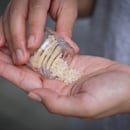
This is the Best/Worse Day of My Life: Chemical-Dependency Intervention
"I describe my intervention day as the worst and best day of my life. I still keep in contact with the nurse who reported me for my diversion activities. It seems funny that we stayed in touch. I call her at least once a year on the 22nd of June just to say thank you for saving my life (Dittmann, 2012, p.39)."
Could this be you? Recent statistics report that between 14% and 20% of practicing nurses in the nation suffer from chemical dependency/substance use disorder (The National Council of State Boards of Nursing [NSCSBN], 2018).
What is the difference between chemical dependency and substance use disorder? Chemical dependency is the compulsive use of chemicals despite their negative effects. Substance use disorder involves the use of drugs that are not legal or are not prescribed for the user. Considering these definitions, are you at risk? If you are suffering from substance use disorder, you could be found to be an impaired employee and subject to discipline which may include the loss of your job and your license.
ANA Code of Ethics on Chemical Dependency/Substance Use Disorder:
- “Nurses must be vigilant to protect the patient, the public, and the profession from potential harm when a colleague’s practice, in any setting, appears to be impaired. In a situation where a nurse suspects another’s practice may be impaired, the nurse’s duty is to take action designed both to protect patients and to assure that the impaired individual receives assistance in regaining optimal function…".
- “Nurses in all roles should advocate for colleagues whose job performance may be impaired to ensure that, they receive appropriate assistance, treatment, and access to fair institutional and legal processes. This includes supporting the return to the practice of the individual who has sought assistance and is ready to resume professional duties."
- “If impaired practice poses a threat or danger to self or others, regardless of whether the individual has sought help, the nurse must take action to report the individual to persons authorized to address the problem.” (ANA, 2015, p. 17)
Would you report a colleague to your supervisor, manager, or state board of nursing? If you said yes, you are part of the majority. When asked, 80% of nurses indicated that they would report an impaired colleague. However, only 57% of nurses would confront a suspected impaired colleague. This is important because your safety as well as that of your colleagues, and your patients are all at risk when a colleague works impaired (Narconon International, 2015; The National Council of State Boards of Nursing (NCSBN), 2018).
There are several barriers to nurses intervening/reporting impaired colleagues, among them the most common barrier is that the nurse does not know that there are alternative programs the impaired nurse can participate in instead of being disciplined by the Board of Nursing.
Most states have established an alternative discipline program for the chemically-dependent nurse which includes monitoring, treatment, and re-entry into practice. Confidentiality is a requirement of these programs.
To learn about these programs, review RN.com course: Ohio Law and Rules: Alternative Program for Chemically-dependency/Substance Use Disorder Monitoring. While this course has specific information on Ohio Law, much of the course will help you learn about recognizing, supporting, reporting, and confronting an impaired colleague.
References
Dittmann, P. (2012). Mountains to climb: Male nurses and their perspective on professional impairment. International Journal of Human Caring, 16(1), 34 – 41.
Narconon International. (2015). Signs and symptoms of drug abuse.
The National Council of State Boards of Nursing (NSCSBN). (2018). Substance use disorder in nursing.




